Today, India is a nation of youths; they are the future of the country. As a result, employability is a key factor towards making our demographic dividend a superpower. Initiatives are required to transform opportunities for India’s youth to use their abilities and work towards development of India. In this context, the National HRD Network (NHRDN) Mumbai Chapter, recently organised a Career Fest at Nehru Centre in Mumbai, bringing together industry and academia, to help the student community to make informed career choices. The theme for the fest was “The future of jobs: challenges and opportunities for the youth of India”.
Vineet Dhar, Zonal Head − Retail & Business Banking, ICICI Bank, spoke on career opportunities in the banking sector. Dhar has an extensive experience in the banking industry over the last 18 years. He has experience in managing different functions like Branch Manager, Operations, Sales, Retail, Corporate Invest - ments, Wealth Management, Business in Commercial Banking, Government and Institutional Business, Products, Marketing Risk and Compliance, Training and Service Quality. This is the second in a series— Corporate Citizen brings to you the excerpts from the development session
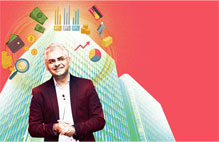
Twenty years back when I look at myself, I was just like you. A young boy from Delhi who wanted to change the world. Many ideas, point of view, critical about everything, cynical about few things, but extremely positive about what change I will bring to what is happening around. I thought that I am the best of god’s creation. I was boarding a train and hundreds and hundreds of people like me where all around. When I realised that I am not the only godchild, there are plenty just like me, my dream about changing the world probably settled on the platform. This is the time when everybody is equal—except the marks in the college. When you pass out from college, no one takes into account how many marks one has scored, what is your degree, how many marks you have scored in economics or accounts and so on. Customers don’t care unless and until the person they are talking to can help.
Back then, it was a similar situation and a lot has changed in last since then. But one thing has not changed, earlier, parents, teachers, tutors, everywhere, people used to tell students be a doctor, engineer or an architect but no one used to tell be a banker.
Today, everybody is thinking what bankers actually do. One thing that still has not changed is that parents do not tell their son or daughter to be a banker. What is so exciting about this profession? Lot of people are already into it, some have been part of it for long. Many people will give you several reasons why to join banking. Most popular reasons would be, stable job, social status, and salary. Today I think, I am qualified enough to tell you my story, why did I became a banker.
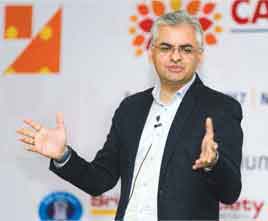
In 1997-1998, when I started working, Citibank probably was the only place when you pass out from campus and say this is a dream company and a dream job. Apart from the popular reasons, why I joined banking is because I think it is the only profession wherein you are able to touch and change people’s lives, because money touches everybody, and we all saw that in last six months. An upper middle class, middle class, CEO, driver, paanwala, kiranawala, anybody, they were in the bank, they were in the queue, all of a sudden—all in the society became equal. There was no differentiation, because it didn’t matter how much money you had in your account, but only thing mattered was, how much money was in your hand. Because that was the only money you were able to spend, it made everybody cash equal, clearly one of the strongest reason for me to join banking. If I had to give you a reason to why I joined the banking, this would have been the first reason. Being in this profession, not only I have grown and learned, but at the same time, I have touched and changed people’s lives.
Since everybody needs finance, what are the three things people come to the bank for? First, Transactions, second Investments and the other is to Borrow. Banks do only two things, either they take money or give money. By virtue of being a banker this is the only profession as per me wherein you get an insight and exposure to every fragment of the society, a businessman is also coming to you, a salaried person is also coming to you, a midsize business and a large corporate is also coming to you. You get an insight and exposure into many businesses. It could be manufacturing, retail, it could be anything what you see around. IT had a big boom in the industry in the last 16 years, Infosys is my customer and a small company in Airoli, Thane is also my customer. I get to see, I get an exposure and I get to learn about many more industries by being in one, which is banking. Today, when I stand here, I not only have enough exposure in banking but also I am proud to share that I have equal amount of exposure in various other industries. Whether it is in telecom side, FMCG side, manufacturing side or any side.
Banking is moving— you are not the future bankers but future customers. If the future consumers are already digital, what are banks going to do. Banking is the only industry, which is just around for a huge change
Why I believe that anybody should pick up banking and especially in today’s age. In the next three to five years, the world will become flatter. Technology and digital are making the world flat. When I joined the ICICI, everything was done in ICICI way and we thought we were the pioneers of the country because we were the first ones to bring ATMs in the country and we were the first ones to bring internet banking. Today I think, what is in an ATM, it is just another commodity, just like an air conditioner in any office or a refrigerator at home.
Banking is moving—you are not the future bankers but future customers. If the future consumers are already digital, what are banks going to do. Banking is the only industry, which is just around for a huge change.
If you talk about 10 startups today in the market, seven are around fintech. There are some or the other financial problems which one of these startups are trying to resolve. Paytm did the same thing. It is a financial startup. Seven out of ten are in financial. If you are digital, if you can think that you can add value over there, you can learn, then probably banking is the place for you in the next 3-5 years.
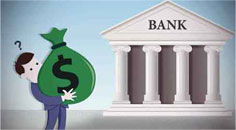
I believe that banking as a profession offers Knowledge to anybody because it is a knowledge led industry. People will come to you, deal with you, talk to you because you will be able to share knowledge and resolve problems. Second thing you will be able to build along with knowledge, is your Relationship Skills because banking is based on two pillars. Trust and Relationships. You leave your money with the banks even though you do not know anybody. Whether the bank will open tomorrow or not, you do not know. You still go and deposit your money. Similarly, banks lend money to customers whom they don’t know as much. But it happens on trust and relationships. This is one of the unique propositions out of the market in the career, where you are exposed to knowledge and relationship skills.
As technology is taking more and more space in every industry, especially banking, relationship side of the banking is growing even further. Because the customers themselves can do transactions, they don’t need to go in branches these days. For example, ninety-six per cent of ICICI transactions today happen on the internet, only four out of 100 customers walk in the branches. Who are these customers? These are the customers who are joining, so who is serving them? They are serving themselves because of technology. So clearly, relationship skills and the domain knowledge in this industry adds value to anyone who probably becomes a part of this.
Today, when I look back in my career, I realise I am very happy being a banker. Somebody said, Vineet, if you are in this industry, you will end up meeting many successful people. People who already have money, that was a shift in my mind, if anybody is holding money, if anybody is successful I would want to meet those people. Everybody would want to meet successful people, you would want to learn, and you will get something back while doing business. You build a relationship with a person, you understand how the journey of the person has been, from where did he start, what all did he do? You understand the psyche and the journey of a successful person. Which was probably one of the key reasons for me to probably look at this as a career. This is one profession, which will definitely give exposure and meet good people and successful people in the society.
You leave your money with the banks even though you do not know anybody. Whether the bank will open tomorrow or not, you do not know. You still go and deposit your money. Similarly, banks lend money to customers whom they don’t know as much. But it happens on trust and relationships. This is one of the unique propositions out of the market in the career
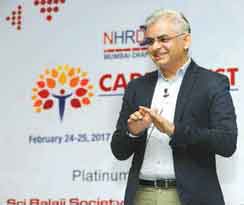
In the year 2000, Indian economy actually opened up. The word ‘retail’ came to India. Today, everything that you see around, whether it is Café Coffee Day or Starbucks, any other retail store that you see. This all came post 2000. India then, was the fastest growing economy in the world, growing by 10%. Back in 2000, there were immense opportunities. Today 17 years later, what do I see? 10% has become 7% but still at 7%, India is the fastest growing economy in the world. China is slowing down. In that growing economy, in that growing phase of a country who are the beneficiaries? The younger people. If the economy is growing, what is the first leg of the economy, which will grow the fastest? Financial Services, because the country needs more and more money to grow. You need finance professionals who need money and who understand money. In my view, one of the brightest growth prospects among all the industries today one can find is the Financial Services. It doesn’t matter if it is banking, general insurance company or it is a mutual fund side of the business or private equity side of the business, doesn’t matter.
The good thing of the younger generation is, all are aware, all of you read and all of you are digitally connected. You are aware and understand what is happening in the world. That is what probably will keep you ahead of others. Another reason for anyone to probably look at this industry is immense growth prospects, and the way it is growing it can only be better.
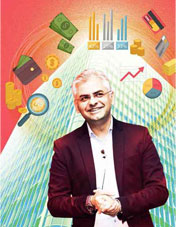
When I joined the credit card business in Citi Company, there I learnt creation and collection side of business, how to issue a credit card, after you use the card when the billing date is due, when the customers don’t pay, someone has to call, someone has to go and collect. I did that for three years. This gave me a brilliant insight of how people use the credit card and what happens when they are not capable to payback. In India, only 1% of people have intent issue, 99% are very good with intent. They want to payback what they have taken, god fearing. This is the whole premise of running a bank. Nobody wants to cheat and nobody wants to hold anybody’s money. So first three years, I learned if anyone takes money, why they don’t give it back.
I was young at that time; it was difficult for me to understand emotions of people. Money evokes lot of emotions. You go to a middle class family, they might have taken a loan for a flat, and because of daughter’s education, or son’s wedding, what if they are not able to pay back. It is not that the person wants to cheat, it is the situation, and it is the circumstance. This profession allows to understand that, which another profession allows an 23-24 year old individual allows to understand such kind of emotion. That’s what I learned in the first three years.
Today in your career, it is important to make a right choice, because there are too many options, too many options lead to too much confusion. My generation did not have as many options. ‘Will it take me where I want to go?’ This is what you should think
Later, I moved into ICICI and then moved in some other business. So the first business was giving money and collecting it back, the second business was how to raise money—deposits. You have surplus savings, where do you keep it. You keep it in to fixed deposit, you keep it in an account, you keep it in post office, wherever. Raising the deposits. That was the second side of the business I got into. The third side of the business I exposed to was Wealth Management, the super-rich from the society. Too much money, less time, you don’t know what to do with that.
Today, after being in the industry for a long time years—I have done collections, I have given money to people, I have taken money from people, managed money for people, managed their investments, given them returns and so on. I have seen them happy; I have seen them crying. They are happy when they make too much money, they cry when they lose their money. But the satisfaction that it gives you, because you were probably able to do something because of which you were able to touch somebody’s life or make somebody’s life better is a great thing.
These are seven points, which I believe are good to look at if you are interested in banking sector. Today, getting a job is easy, but there is a difference between getting a job and getting a career. This is the biggest difference, which many people in the beginning of their career face. I happened to be in banking and now I love banking.
In your career, it is important to make a right choice, because there are too many options, too many options lead to too much confusion. My generation did not have as many options. ‘Will it take me where I want to go?’ This is what you should think. You are at the age where you can now drive, vote, drink and marry. You are an adult now. You have the intelligence, mind, ability and the wisdom to decide for yourself. While picking up, pick up and ask ‘Whether I am picking up a job or a career’?
And they way banking is changing; it is the best time to join. It is changing in many ways. What happened on the 8th of November was a big enough move for the whole economy to see the consequences and the impact of what happened.
by Vineet K